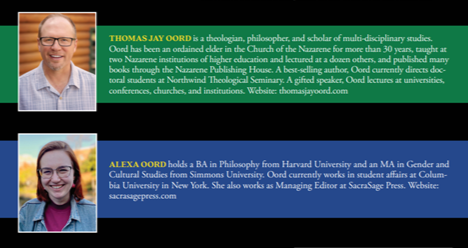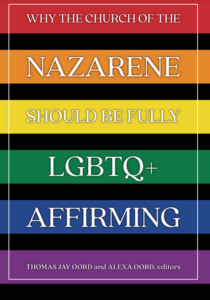Why the Church of the Nazarene Should be Fully LGBTQ+ Affirming
My daughter Alexa and I co-edited a collection of essays with the title, Why the Church of the Nazarene Should be Fully LGBTQ+ Affirming. The writers of the essays are current or former members of the denomination. And their writing is simply OUTSTANDING!
The essays are divided into three sections: Queer Voices, Ally Narratives, and Scholarly Perspectives. More than 90 people write for the book, and it’s almost 500 pages!
Here’s the introduction to the book…
Introduction
The essays in this book were written in response to an invitation. We (Tom and Alexa) invited people to contribute to a book we would title, “Why the Church of the Nazarene Should be Fully LGBTQ+ Affirming.” You’re reading that book.
Despite the shared theme, the essays published here are diverse. Some are written by queer people, and they narrate portions of their life journeys. Those narratives often include struggles and the eventual affirmation of their LGBTQ+ identities and experiences as healthy rather than sinful. Many felt persecuted by people and the culture of the Church of the Nazarene, so they left the denomination. They did not feel loved. Other queer people remain but feel marginalized, shamed, and traumatized.
Some essay writers are parents, siblings, or allies of LGBTQ+ people. Most who become fully affirming do so because of close relationships with queer loved ones. Some parents, for instance, felt compelled to rethink their views on LGBTQ+ matters after their children “came out” or identified as non-heteronormative. Many reevaluated what it means to live as healthy people in healthy societies. They now believe God loves and affirms queer people.
Some contributors to this book are pastors, scholars, or leaders in the church. They believe the denomination needs to change its views on human sexuality. And change the way it treats those who support queer people. Some of these writers call for honest conversations, including impunity for those who think current Manual statements fail to reflect well the love of Jesus.[1] In other essays, scholars explain why scripture, theology, and history support a fully affirming LGBTQ+ position.
Fully Affirming?
By “fully affirming,” contributors don’t mean “anything goes” sexually. After all, “not everything is beneficial,” to quote the Apostle Paul (1 Cor. 10:23). Some sexual activity—homosexual and heterosexual—isn’t healthy, and life-long partnerships in marriage have immense value. They mean they fully affirm people with LGBTQ+ identities, orientations, and desires. The denomination’s current statement on human sexuality does not reflect well the love Jesus calls his followers to express.
Although this book has more than 90 contributors, one may think a tiny percentage of Nazarenes want change. But there are good reasons to believe hundreds of thousands in the denomination agree with the book’s contributors. And that number rises daily. A 2007 Pew poll showed that 31% of Americans who identify with the Church of the Nazarene thought society should accept homosexuality. That percentage jumped to 40% by 2014.[2] We suspect the percentage is higher today.
A Barna Report indicates that 46% of Christians under the age of 40 want laws to protect Same-Sex Marriage and LGBTQ+ rights.[3] There are two major takeaways from that Barna survey. 1) American Christians increasingly accept LGBTQ+ people and their healthy sexual behavior. 2) younger American Christians are more accepting of queer people than older Americans.
Young people are leaving the Church of the Nazarene. Many believe the denomination’s views on human sexuality do not reflect the love of God. A 2008 poll of twenty religious groups said the holiness tradition—of which the Church of the Nazarene is the largest denomination—is the worst of all religious groups at retaining their young people. Only 32% of Nazarene youth remain.[4] A similar poll in 2015 showed no change in this rate of exit.[5]
The Church of the Nazarene is global, of course, and while the USA segment is the strongest financially, it represents a fairly small membership percentage overall. Our experience among European Nazarenes, however, is that the majority are more progressive on LGBTQ+ issues than American Nazarenes. But African and Latin-American Nazarenes are less progressive on this issue. They aree less progressive on other issues, such as women in leadership and modesty in dress.
A Queer Narrative
These essays also tell a story. It’s a narrative about how a marginalized group has been mistreated and denied full acceptance. That story points to a loving and accepting God who calls us all to love and accept queer people. A peculiarly loving God loves peculiar people of all varieties and wants us to do the same. This love means full acceptance of LGBTQ+ people, their identities, orientations, and healthy sexual expressions.
As editors, we hope these essays foster that acceptance. We believe the Church of the Nazarene has something positive to offer the world. But the heart of the denomination’s message—love—has been muted and muffled by its statements about LGBTQ+ people.
In the spirit of spurring “one another to love and good deeds,” as the writer of Hebrews puts it (10:24), we offer this book.
—Thomas Jay Oord and Alexa Oord

[1]. The call for safe and irenic discussion of LGBTQ issues is also present among Church of the Nazarene clergy. See the doctoral work of Reg Watson on this matter (R. G. Watson, Nazarene Clergy Responses to Homosexuality and Interactions with LGBT People [Doctoral dissertation, Regent University, 2015]). See also Bruce Barnard’s research and preliminary writing in preparation for dissertation work, “You’re Losing Us – The LGBTQ Community and the Church of the Nazarene.”
[2]. See https://www.pewresearch.org/fact-tank/2015/12/18/most-u-s-christian-groups-grow-more-accepting-of-homosexuality/
[3]. On this, see https://www.barna.com/research/americas-change-of-mind-on-same-sex-marriage-and-lgbtq-rights/
[4]. See http://thomasjayoord.com/index.php/blog/archives/atheists_only_slightly_worse_at_retaining_children_than_holiness_folk
[5]. Also see https://www.pewforum.org/2015/05/12/chapter-2-religious-switching-and-intermarriage/pr_15-05-12_rls_chapter2-04/


Comments
A simple question, why don’t you just leave the Church of the Nazarene and found a gay, homosexual, queer, whatever you call you it, church for yourselves? We are a holiness church, therefore abomination will never be part of our denomination. Your God is not ours, your faith is not ours, your sinful way of life is not ours, your damnation is not ours. You may try but you’ll never prevail. If you do, rest assured there will always be holy nazarenes who will never, ever put up with sim in their lives or church.
I’m sad that you feel this way, Rob SantAnna. For an answer to your initial question, get a copy of My Defense. It’s only 99 cents as an ebook on Amazon and 4.99 as a print book.